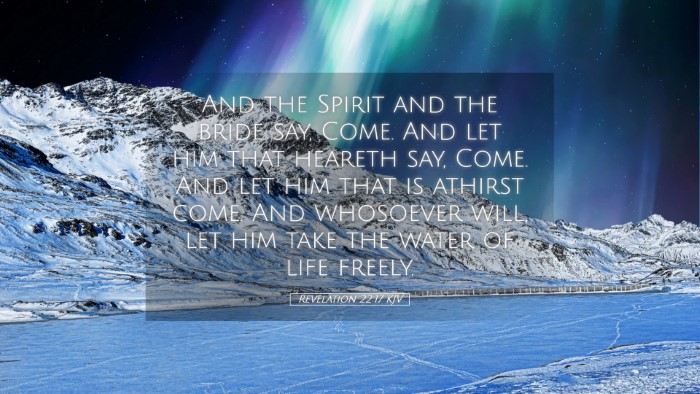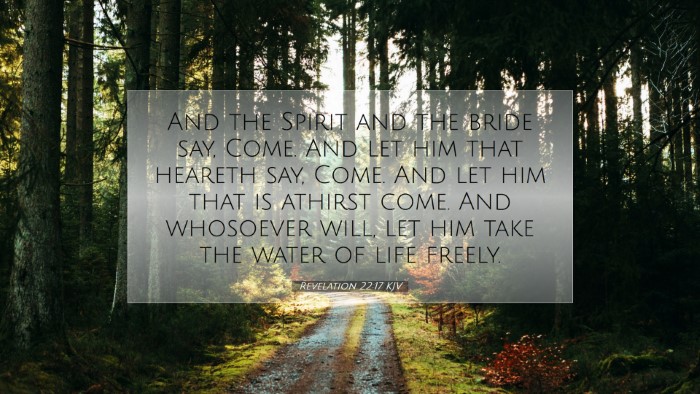Commentary on Revelation 22:17
Verse Context: Revelation 22:17 reads, “And the Spirit and the bride say, Come. And let him that hears say, Come. And let him that is athirst come. And whosoever will, let him take the water of life freely.” This final invitation in the Book of Revelation encapsulates the essence of Christian hope and the call to salvation.
General Overview
The verse represents a profound invitation to all who seek spiritual fulfillment. The Spirit, symbolizing God’s active presence, and the bride, representing the Church, collectively urge humanity to embrace the salvation offered through Jesus Christ. This call is inclusive, emphasizing the availability of grace to anyone desiring to partake in eternal life.
Insights from Public Domain Commentaries
Matthew Henry's Commentary
Matthew Henry highlights the cooperative aspect of the Spirit and the bride in this invitation. He notes that the Spirit’s role is to awaken the conscience and incline sinners toward Christ, while the bride, the Church, encourages the faithful to join in the call. Henry emphasizes the urgency and the universality of the invitation, stating that it extends to all who are thirsty, symbolizing those in need of spiritual sustenance.
Albert Barnes' Commentary
Albert Barnes elaborates on the phrase “whosoever will,” emphasizing the freedom and voluntary nature of accepting Christ. He asserts that this reflects God’s desire for all to engage with the gospel, reinforcing the doctrine of free will. Barnes encourages readers to understand the "water of life" as a metaphor for eternal satisfaction found only in Christ, urging that it is available “freely,” indicating no cost or precondition to receive it.
Adam Clarke's Commentary
Adam Clarke delves into the significance of the thirst mentioned in the verse. He suggests that this thirst represents a deep spiritual longing for truth and reconciliation with God. Clarke also interprets the water of life as a symbol of the Holy Spirit's influence, which quenches this spiritual thirst. He invites believers to reflect on their personal experiences of spiritual thirst and how they have been satisfied through Christ.
Theological Implications
- The Role of the Holy Spirit: The active engagement of the Holy Spirit in drawing individuals to Christ is essential in understanding the dynamics of salvation.
- The Church's Mission: The bride's role highlights the responsibility of the Church in proclaiming the gospel and extending invitations to those seeking salvation.
- The Universality of the Invitation: The phrase “whosoever will” serves as a powerful reminder of the inclusive nature of God’s grace, extending an invitation to all without exception.
- The Nature of Spiritual Thirst: This verse invites reflection on personal spiritual needs and recognition of the only true source of fulfillment found in Christ.
Practical Applications
This verse serves multiple audiences: pastors, students, theologians, and scholars, providing rich opportunities for reflection and application:
- For Pastors: Emphasize the centrality of invitations in preaching. Encourage congregations to reach out to the spiritually thirsty in their communities.
- For Students: Essays could explore the implications of free will in salvation as highlighted by Barnes, challenging students to consider its practical applications in their faith journeys.
- For Theologians: Examine the theological significance of grace and the invitation to partake in eternal life, considering how this invitation relates to soteriology.
- For Scholars: Investigate the literary and rhetorical techniques utilized in Revelation, particularly the symbolic use of water and thirst as reflective of deeper spiritual realities.
Concluding Thoughts
Revelation 22:17 encapsulates the essence of the Christian faith—an open invitation to partake in the grace of God through Jesus Christ. It symbolizes hope, inclusiveness, and the empowering role of the Church and the Holy Spirit in the mission of salvation. As believers reflect on this powerful invitation, they are reminded of their own journey towards the water of life, which quenches the deepest thirsts of the soul.


